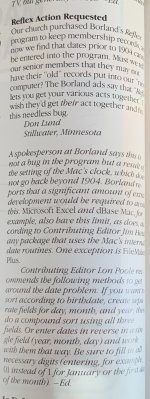SetDate is a lifesaver and is currently on or will be on all of my classic Macs.
When I was still running my lab, pre-pandemic, I hadn't yet deployed SetDate to all of the machines. It will be something I do this summer when I do my annual maintenance on them. If you want days of the week to line up with 2020, simply set your calendar to 1992. It was the most recent leap year whose calendar matches up with 2020. (Leap years are on a 28 year cycle; other years are every 6 or 11 years, depending on the calendar cycle. The World Almanac has a good explanation of how this works.)
By the time 2040 rolls around, we'll likely just set our clocks back to dates the Macs were new anyhow, much like how some classic car enthusiasts keep 1950s calendars in their garages to add to the "period appropriateness".

